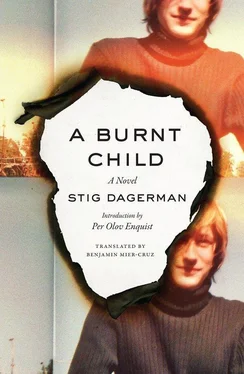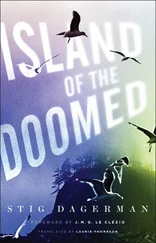If it hadn’t been too late, his reason would have told him what he already knew, the shocking truth that he himself experienced so many times: namely, that we are never so tender to the ones we are bound to as when we are certain that the stranger we love actually loves us in return. He can only understand this when he himself is tender to Berit because of Gun’s love, yet he can’t understand this about anyone else. This explains why he is so upset and why such filthy thoughts are flowing out of him, like a busted sewer. As he leans against the window post, he thinks: they’re just like this when they’re alone together. They sit at the kitchen table, drink, and fondle each other as they’re doing now. They are just like dogs when they are alone together.
At the same time, it turns three o’clock. His already misty eyes fill with tears. The tiger is chewing the gazelle and considers it just. It’s only right for him to think of his mother after a year has passed since she died. There isn’t anyone who is more right than he. He knows it when he leaves the room, and he is more convinced of it when he goes outside. It is twenty-five degrees below and dark as it usually is in winter, a luminous darkness that reflects itself in the snow and ice. He walks a bit and then drops to the ground. Because he is so right and everyone else is so wrong, he lets himself lie there and even cries for a while. Then he is afraid of freezing to death. That’s when he feels the weight of the leash inside his pocket. It makes him feel like hanging himself. And when they come out with their lantern, they will find him hanging from a tree. Now he is staggering around, feeling after branches. In his heart, he feels he is already hanging. His throat is so taut that he can scarcely swallow, and he’s on the verge of vomiting. Finally, he finds a suitable branch, makes a noose in the leash, brushes the snow and ice off the branch, and ties the leash around it. When he sticks his head through the noose, the branch snaps.
He knew it would happen. But he is satisfied he tried. And because he had been saved, he doesn’t try it again. He feels somewhat better, a little less miserable. But he is immediately sad again because no one opens the door and calls out to him. They have left him all alone in the snow and the darkness. He simply cannot fathom anything so inhumane. Some light trickles through the slits of a shutter. Laughter and loud voices are inside. But inside him is only darkness and silence. And the beginning of tears, too. The memory of his mother shoots up inside him like a smarting pain. Like an ache and a fever.
Silently, he opens the door. The alcove is empty. Berit has gone to visit the others. His fever escalates, but at the same time his mind becomes clear, as a fevered person’s does. He turns on a flashlight and lays it down on Berit’s bed. He looks for a pen and paper. Then he writes a letter. Not to himself but to the others. The whole time he writes he hopes that the door will open, that light and warmth from the main room will come rushing in, and that someone will carry him into the light and the warmth. But no one comes, and soon the letter is finished. When it’s completely finished, he folds it up and puts it in his pocket.
The candle is almost burnt out when he joins the others. But none of them notices that it’s burning down. Not even Berit, who has been given rum, a lot of rum. Therefore, she doesn’t see the candle, doesn’t see much of anything, really—maybe not even Bengt. Slowly, the room begins to spin, and she seems to be enjoying it. Gun and the father are sitting with their arms around each other. He stands for a long time and watches them, the whole time seeing what he expected to see: they look exactly as they did on their wedding night. There are yellow pears on their plates. The father frees his hands and starts paring with his razor; either there was nothing better, or he wants to be funny. Once it is peeled, he tosses the razor on the table and starts feeding Gun.
Then the son goes up to the father very closely and hits him lightly on the shoulder, but not as lightly as he wanted. The father asks him what he wants. He says that it’s three o’clock. No one seems to understand.
No, it’s not, the father says.
Then he shouts so they will understand:
Aren’t you all happy now!
Gun chuckles, but he is far from finished.
Aren’t you happy? he yells. It’s Mama’s anniversary. One year since she died!
The room grows silent except for the scraping of chairs. Bengt blows the candle out before the paper starts to burn. But it doesn’t get dark, because Berit turns up the flame of the kerosene lamp and because her hand is so white. She gazes at Bengt, gazes so strangely at him that he has to look away.
My boy, the father says with beautiful, glistening eyes, don’t you think I remember? Come here. Don’t be sad. Don’t cry, my boy.
But he doesn’t move. Everything is as he expected. Now it’s only confirmation that he’s looking for, confirmation that everything is how his tiger said it would be. Enraged, he shouts:
Your year of mourning is over. Mine is just beginning!
The moon, the pale moon of winter, and a multitude of pointy stars shine outside. Sleds are waiting by the shore, and their runners are glistening. He kneels down; the skin around his throat tightens. One of the sleds is sturdy and new, and he ties the leash around its handles. When everything is ready, Gun calls out to him. He looks up at the cottage one last time. Because she stays there and continues to call out to him, he looks up one more time. When she still doesn’t move, he runs toward the cottage, stumbles, falls down, and white with snow, rushes up the steps. She pulls him close to her so that she can hold him. She is afraid because she doesn’t understand a thing. She can’t understand why he doesn’t see that she is glad to have found him again.
But love is just a game of misunderstanding. Instead of wrapping his arms around her and saving himself, he takes a step down. The leash hook glistens when he raises his hand. Then he strikes her across the face like a dog. But she doesn’t cry out. She merely leaves him alone.
He stands alone, cold, and naked on the steps. Hitting a woman is like hitting an animal. Afterward, you feel dreadfully alone. Afterward, you cannot be forgiven. But without forgiveness, he is hopelessly lost. And it is precisely this hopelessness he was searching for. But now that he has found it, he is terribly afraid, so afraid that he can’t even move. And when Berit comes out to him, he is still standing hopelessly still.
What’s wrong, Bengt? she whispers.
She isn’t aware of what has happened, she never is. When he doesn’t answer, she looks at him as curiously as she had just done inside. After studying him for a while, she turns away to the door.
Do you know what you look like? she whispers.
No, he whispers back at her. And it’s true: he couldn’t know. All he knows is that it’s over, and to realize this is more horrific than he ever imagined.
Like a dog, she answers.
Now everything is confirmed. There is nothing left. There is only one thing to do, and he does it. He pushes past her, flings open the door, and marches up to the table, up to the woman who hates him and up to the man he is indifferent to. He still might need a little courage to be able to do what he wants to do. Then the courage comes. As he stands behind the father’s chair, Gun suddenly starts talking about a Negro. She had only seen him on the street and thought he was beautiful. But men cannot, without hatred, tolerate it when their women talk about Negroes being beautiful. There is a lyncher in every man, for lynchers are only men who are afraid of their own women.
As irretrievably lost as can be, he pulls back his sleeve from his left wrist. As though in a dream, he sees the father’s razor sink into his flesh. Everything is so dreamlike that it doesn’t even hurt. When he drops the razor, he stands there and watches with surreal surprise how the blood slowly fills the wound, runs over his wrist and down his hand, and then falls with heavy drops to the floor. Then Berit screams. Gun and the father see it almost immediately, but first they are just as surprised as he. He hears Berit slam the door behind him, a soft, quiet sound that he has never heard before. Then there’s an almost comical bustle that he doesn’t really understand. These three people are running in circles around each other. He is the only calm one. With a sensation of surprising serenity, he feels his life flowing out of him with every throb of his shredded artery. The onset of death feels so peaceful that he finds their commotion almost absurd. Step after step, he shuffles back toward the door and braces his back against the nook between the door and the wall. He is looking down at his hand the whole time. The back of it is white and beautiful. He is not afraid, because we are only afraid beforehand. Once it has happened, however, we are only filled with expectation.
Читать дальше












